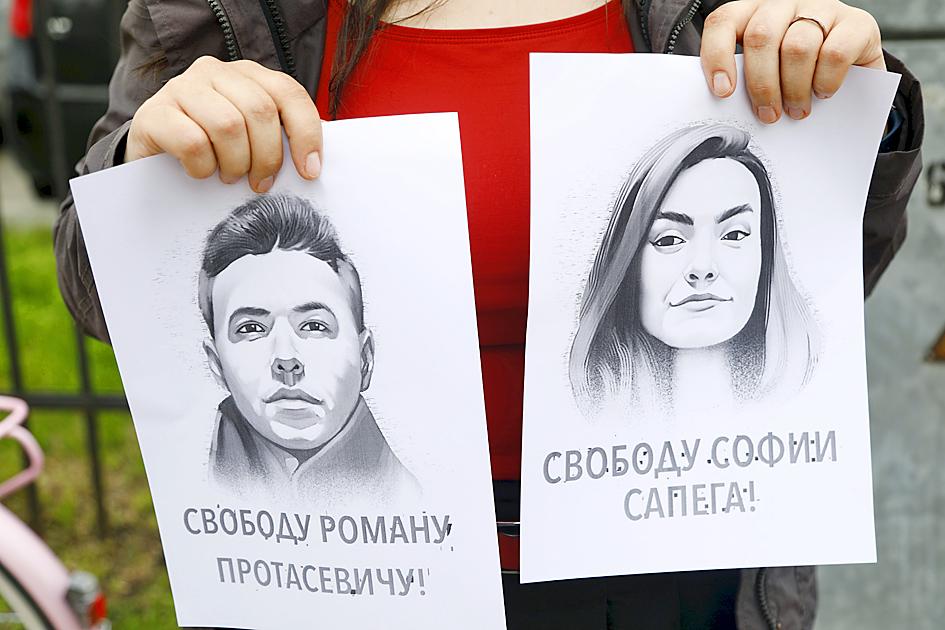Belarus’ regime was increasingly isolated yesterday, as Europe cut air links and calls grew for more action over its diversion of an airliner and arrest of a dissident on board.
After weathering a wave of protests and Western sanctions last year, Belarusian President Alexander Lukashenko was facing extraordinary new pressure over Sunday’s rerouting of the Ryanair flight to Minsk and arrest of opposition journalist Roman Protasevich.
More Western leaders joined calls demanding Protasevich’s release, after the EU agreed at a summit on Monday to ban Belarusian airlines from the bloc and called on EU-based carriers not to fly over its airspace.

Photo: EPA-EFE
Air France, Finnair and Singapore Airlines became the latest carriers to suspend flights over Belarus, following Scandinavian airline SAS, Germany’s Lufthansa and Latvia-based regional airline airBaltic.
Opposition leader Svetlana Tikhanovskaya said the global community needed to go further, urging the US to take action in a call with US National Security Adviser Jake Sullivan.
Speaking to reporters in Vilnius, where she lives in exile after a disputed election in August last year, Tikhanovskaya called for “comprehensive” international measures to force the regime to give up power.
“This is the time to act,” she said.
“Suspension of flights over Belarus doesn’t solve the real problem. The problem is the terrorist regime that rigged elections last year,” she said.
She asked for the Belarusian opposition to be invited to next month’s G7 summit in Britain, an initiative that sources close to French President Emmanuel Macron said Paris supported.
British Prime Minister Boris Johnson joined calls for Protasevich to be released, saying: “Belarus’ actions will have consequences.”
The UN Human Rights Office also demanded the immediate release of Protasevich and his Russian girlfriend, Sofia Sapega, who was also arrested after the Athens-to-Vilnius flight landed in Minsk.
EU leaders on Monday said that they would adopt further “targeted economic sanctions” against the Belarusian authorities to add to the 88 regime figures and seven companies on a blacklist.
Lukashenko and his allies are already under a series of Western sanctions over a brutal crackdown on opposition protests that followed his disputed re-election to a sixth term last year.
Protasevich, 26, was a cofounder of the Nexta Telegram channel, which helped organize the protests that were the biggest challenge to Lukashenko’s long rule.
He had been living between Poland and Lithuania.
Belarusian state television late on Monday broadcast a 30-second video of Protasevich confirming that he was in prison in Minsk and “confessing” to charges of organizing mass unrest.
The footage showed Protasevich — who could face 15 years in jail — with dark markings visible on his forehead, saying he was being treated “according to the law.”
US President Joe Biden said the video appeared to have been made “under duress.”

NATIONAL SECURITY THREAT: An official said that Guan Guan’s comments had gone beyond the threshold of free speech, as she advocated for the destruction of the ROC China-born media influencer Guan Guan’s (關關) residency permit has been revoked for repeatedly posting pro-China content that threatens national security, the National Immigration Agency said yesterday. Guan Guan has said many controversial things in her videos posted to Douyin (抖音), including “the red flag will soon be painted all over Taiwan” and “Taiwan is an inseparable part of China,” while expressing hope for expedited “reunification.” The agency received multiple reports alleging that Guan Guan had advocated for armed reunification last year. After investigating, the agency last month issued a notice requiring her to appear and account for her actions. Guan Guan appeared as required,

A strong cold air mass is expected to arrive tonight, bringing a change in weather and a drop in temperature, the Central Weather Administration (CWA) said. The coldest time would be early on Thursday morning, with temperatures in some areas dipping as low as 8°C, it said. Daytime highs yesterday were 22°C to 24°C in northern and eastern Taiwan, and about 25°C to 28°C in the central and southern regions, it said. However, nighttime lows would dip to about 15°C to 16°C in central and northern Taiwan as well as the northeast, and 17°C to 19°C elsewhere, it said. Tropical Storm Nokaen, currently

PAPERS, PLEASE: The gang exploited the high value of the passports, selling them at inflated prices to Chinese buyers, who would treat them as ‘invisibility cloaks’ The Yilan District Court has handed four members of a syndicate prison terms ranging from one year and two months to two years and two months for their involvement in a scheme to purchase Taiwanese passports and resell them abroad at a massive markup. A Chinese human smuggling syndicate purchased Taiwanese passports through local criminal networks, exploiting the passports’ visa-free travel privileges to turn a profit of more than 20 times the original price, the court said. Such criminal organizations enable people to impersonate Taiwanese when entering and exiting Taiwan and other countries, undermining social order and the credibility of the nation’s

‘SALAMI-SLICING’: Beijing’s ‘gray zone’ tactics around the Pratas Islands have been slowly intensifying, with the PLA testing Taiwan’s responses and limits, an expert said The Ministry of National Defense yesterday condemned an intrusion by a Chinese drone into the airspace of the Pratas Islands (Dongsha Islands, 東沙群島) as a serious disruption of regional peace. The ministry said it detected the Chinese surveillance and reconnaissance drone entering the southwestern parts of Taiwan’s air defense identification zone early yesterday, and it approached the Pratas Islands at 5:41am. The ministry said it immediately notified the garrison stationed in the area to enhance aerial surveillance and alert levels, and the drone was detected in the islands’ territorial airspace at 5:44am, maintaining an altitude outside the effective range of air-defense weaponry. Following